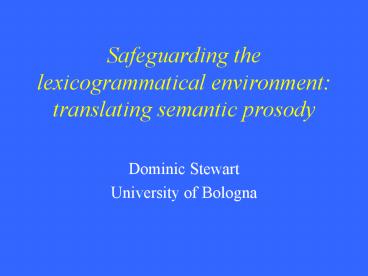Safeguarding the lexicogrammatical environment: translating semantic prosody - PowerPoint PPT Presentation
1 / 21
Title:
Safeguarding the lexicogrammatical environment: translating semantic prosody
Description:
Semantic prosody in translation ... introduction to semantic prosody, and its possible relevance to the passage from ... trail of semantic prosody. I geared' my ... – PowerPoint PPT presentation
Number of Views:151
Avg rating:3.0/5.0
Title: Safeguarding the lexicogrammatical environment: translating semantic prosody
1
Safeguarding the lexicogrammatical environment
translating semantic prosody
- Dominic Stewart
- University of Bologna
2
A consistent aura of meaning with which a form is
imbued by its collocates (Louw 1993157)
3
- Semantic prosody in translation
- How corpus users convert data into evidence of
semantic prosodies
4
- a number of lessons devoted to textual analysis
and discussion of the final passage of James
Joyces The Dead - students given a week to translate the passage
into Italian - submission of translations
- introduction to semantic prosody, and its
possible relevance to the passage from Joyce,
focusing in particular on three sentences / parts
of sentences
5
- Re-translation by the students of the three
sentences in the light of discussions of semantic
prosody - comparison of the translations before and after
- discussion of the methods used to extract
semantic prosodies from corpus data
6
- THE AIR OF THE ROOM CHILLED HIS SHOULDERS
- OTHER FORMS WERE NEAR
- THE TIME HAD COME (FOR HIM TO SET OUT)
7
chillVERB my your his her its
their
8
- other forms
- other formSUBST
- formSUBST were
- formSUBST beVERB
- were near
- formSUBST near
- were near.
- beVERB near
- beVERB near.
9
- BEFORE included
- Laria della stanza gli raffreddò le spalle
- Laria della stanza gli ghiacciò le spalle
- Laria della stanza gli infreddoliva le spalle
- Laria della stanza rinfrescò le sue spalle
- AFTER comprised almost exclusively
- Laria della stanza gli gelò/gelava le spalle
- Laria della stanza lo fece rabbrividire
- Laria della stanza gli raggelò le spalle
10
- BEFORE included
- Cerano altre forme vicino
- Vicino cerano altre forme
- Altre forme erano lì vicino
- Altre forme erano presenti
- Altre figure erano nei paraggi
- AFTER comprised almost exclusively
- Altre forme/figure/sagome (gli) erano vicine
- Altre forme/figure/sagome gli erano accanto
- Accanto a lui vi erano altre forme
11
- BEFORE included
- era arrivato il momento/il tempo
- era arrivata lora
- era venuto il tempo/momento
- AFTER comprised almost exclusively
- era giunto il momento/il tempo
- era giunta lora
12
THE AIR OF THE ROOM CHILLED HIS SHOULDERS
- Specific intuition
- Intuition apparently confirmed by first search
- Investigation stopped
- Confirming concordance presented to class
13
OTHER FORMS WERE NEAR
- Hunch
- No confirmation from initial search
- Numerous further searches
- Eureka! Hunch supported by a search
- Investigation stopped
- Confirming concordance presented to class
14
THE TIME HAD COME
- Specific intuition
- No confirmation from (numerous) searches
- One concordance presented to class
- Corpus data overruled by intuition
15
Having your cake and eating it
- Avere la moglie ubriaca e la botte piena
- No se puede estar en misa y repicando
16
On the trail of semantic prosody
- I geared my searches...
17
chilled his shoulderschilled his
shoulders.chilled his his shouldershis
shoulders.chilled shouldersshoulders.c
hillVERB chillVERB his shoulderschillVE
RB his CHILLverb his/her/your etc.
shoulderschillVERB his/her/your
etc.chillVERB his/her/your etc.
shoulderNOUNchillVERB his/her/your etc.
shoulderNOUN.
18
On the trail of semantic prosody
- I geared my searches
- in order to find what I was looking for
- when I found it, I abandoned the search
- when I didnt find it, I overruled the corpus data
19
- How do you begin a search (as objectively as
possible)? - With what criteria do you convert data into
evidence? - At what point do you terminate a search?
20
- constant exposure, of the most humbling kind,
to real examples (Louw 1993173) - Semantic prosodies have, in large measure and
for thousands of years, remained hidden from our
perception and inaccessible to our intuition
(ibid.)
21
- If corpus data re SPs can help translators, are
we actually willing to be helped by it, or will
we do no more than select the data that best suit
or confirm our own perceptions / preconceptions?
(see Tymoczko 1998657-8) - Will corpus evidence of semantic prosodies
dishearten translators, inasmuch as it may simply
lend weight to the notion of a supposed
impossibility of translation?






























